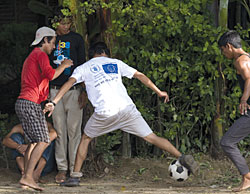 |
BBC correspondent and director Amanda Burrell begins by following Chandra, a refugee and midwife, whose narrative describing camp life intersects nicely with a sequence of the impressively efficient food operations, representative of the humanitarian aid work honed over the 20 years of the camps' existence. More importantly, it allows us to appreciate the trauma of Chandra's and her elderly parents' expulsion from Bhutan and their current plight, illustrative of the experience of many of her peers.
For the middle portion of the film Burrell shifts to Bhutan, where the crew is allowed a brief day visit to that gorgeous and tightly restricted country. It is here that she garners some of the most intriguing interviews, interspersed as it is with weak Lonely Planet-esque cultural relativisms. There are chilling comments by Michael Rutland, an apologist for the Bhutanese position, that gives a frightening double-edge to the response to human rights activists protesting the citizenships act of 1988: "Because harmony was so much part of the way of life? it was very difficult to know how to deal with this sudden promotion of disharmony? I think measures were taken to try to promote harmony."
It is followed by denials from a government official of any wrong-doing and denials that most of the refugees were ever actually Bhutanese citizens. But upon her return to Nepal Burrell chooses to provide a platform to negate the Bhutanese version of events. The footage of an aged Bhutanese man with his battered folder of worn documents of taxes, marriage certificates and yes, an unmistakable citizenship identity card provides a striking illustration of the frustration and lunacy of the situation of the refugees.
By minimizing any indications that many Bhutanese refugees have forayed outside the camps for work and education, Forgotten Refugees fails to underscore the one other option for the remaining Bhutanese refugees - some kind of compromise that affords the Bhutanese refugees the right to lawfully work and live outside the camp in Nepal either as citizens or withholding their political rights for repatriation.
In the final portion of the documentary Burrell focuses on the resettlement program to third-countries. Her treatment of the subjects who have chosen third-country repatriation captures both the sense of uncertainty and the tantalizing promise of a more prosperous life. But it also underscores another often missed aspect - the path to the conclusion of the stateless status of its participants. For a Nepali audience, The Forgotten Refugees might be a misnomer, but Burrell does a very important service in reminding us that the current third country solution that will take an estimated five years to implement accommodates presently only half of the 100,000-plus refugees, that the camps will continue to require international aid, and that the promise of prosperity in the developed world is only a substitute for the aspirations of the displaced refugees for whom a political solution has not yet been forthcoming.
Minister of Information Lyonpo Khandku Wangchuk, when confronted with the allegations that people were tortured, countered, "We are a peace loving Buddhist country. One of the major problems in our cities today is stray dogs. We don't have the heart to get rid of them. How do we do this to fellow human beings, fellow citizens?" With Bhutan unable to accommodate the cultural expression of a minority in its definition of citizen, the international community has given it a pass on this transgression of rights as it absorbs the displaced victims of Bhutan's radical ethnic policing. Perhaps the world and Nepal will have to deal next with displaced dogs, who are not native to Bhutan.
The Forgotten Refugees airs on the BBC World News channel on 25 April at 6.55 PM; 26 April 6.55 AM, 1.55 PM and 9.55 PM local time.



